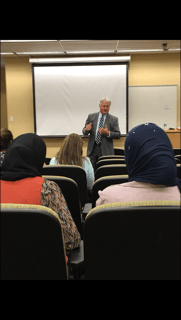Valencia President Sandy Shugart Discusses Immigration

April 20, 2017
President of Valencia College Dr. Sandy Shugart held an open discussion to discuss the recent policy changes regarding travel and immigration on Tuesday, April 11, on East Campus. Valencia has over 500 international students who could be directly impacted by the changes.
“There has been concern over the recent change in the political climate, and what that might mean for some students and the country. Of course, I can’t speak for who’s in Washington, but I’d love to visit and hear what their concerns are,” Shugart stated.
Shugart briefly elaborated on where it goes wrong most of the time for undocumented individuals.
“I don’t think you need to feel a sense of personal threat, unless you’re involved in something that is a high risk behavior. If you’re involved in committing a crime you’re in deep trouble. Because it is very easy to deport people without even having a court hearing. There is no due process for immigrants committing a crime right now,” Shugart stated.
Shugart addressed the major issue of the seven countries involved in the travel ban. He discussed what students who are from there, and still have family there, should do.
Judges in Hawaii, Washington, and Maryland have blocked the president’s latest executive order banning travel from the seven countries for 90 days. The travel ban is currently on the back burner in the federal courts.
The organizer of the event Nissa Hopkins Professor of EAP (English for Academic Purpose) spoke on the inspiration for the discussion..
“Certainly with the talk of building a wall, the talk of changes in immigration policy, it has created uncertainties with international students if these travel bans do get solidified and are completely in place it really impacts them,” Hopkins stated.
“I just want to know that they have a support system and that the college is open and inclusive and celebrates diversity, and believes in diversity, and believes in that strength and unity, and Dr Shugart was kind enough to come speak to my students to see what answers he can give them,” Hopkins said.
“If you are from the seven travel ban countries, I really suggest not going home. Valencia and myself are willing to work with you. Things may change, but many things are in the air,” Shugart stated.
“You are not a burden to our society, you are a contributor. I don’t think it’s a time to be worried. I do think it is a time to be watchful,” Shugart stated.
Shugart elaborated on his perspective on the contribution of international students.
“Students contribute just as much as faculty. International Students contribute variety of viewpoints, culture, stories and work ethic. I hope they excite the domestic students about culture,” Shugart said.




vince campanalie • Aug 28, 2017 at 12:49 pm
my comment is on your statement,There is no due process for immigrants committing a crime right now,” Shugart stated.
Unless your ignorant, there is no due process for illegal immigrant committing a crime you for forgot to say… i guess. If your here and jump the border illegally your broke US law it says in Valencia CSJ degree. illegal students are a burden quit lieing.
Previous administrations have deliberately kept Americans in the dark about illegal immigrant crimes
Most states and our federal government have kept information and statistics about illegal immigration, crimes committed by illegals and the costs borne by you the U.S. payer out of public view. It is in fact difficult, but not impossible to locate accurate crime statistics involving illegal immigrants. The statistics are buried both to suit a political agenda and to avoid public outcry. Once you read this article, you will quickly understand why.
Demographics – The Pew Research Institute estimates that as of 2014, there are at least 11.2 million illegal immigrants residing in the U.S. This population comprises approximately 3.5 percent of our country’s population.
Of these, by far the largest ethnic population, 52 percent are Hispanics comprised of Mexicans, Central Americans and Cubans.
Six states: California, Texas, Illinois, Florida, New York and New Jersey account for 59 percent of all illegal immigrants residing in the U.S. The fact that 66 percent of all illegal immigrants have lived in our nation for over ten years underscores our long-standing inability to address the serious problem of our inability to control our nation’s borders.
The relationship between illegal immigrants and violent crime
Research conducted by the federal government oversight organization Judicial Watch in 2014 documents that 50 percent of all federal crimes were committed near our border with Mexico.
Of the 61,529 criminal cases filed by federal prosecutors; 40 percent or 24,746 were in court districts along the southern borders of California, Arizona and Texas.
The Western District of Texas had the nation’s most significant crime rate with over 6,300 cases filed; followed by the Southern District of Texas with slightly over 6,000 cases.
The Southern California District with nearly 4,900 cases; New Mexico with nearly 4,000 cases and Arizona with over 3,500 criminal cases ranked 3rd, 4th and 5th.
The U.S. Department of Justice documents that in 2014, 19 percent or over 12,000 criminal cases filed by prosecutors were for violent crimes; and over 22 percent or 13,300 cases were for drug related felonies.
That same year, the U.S. Sentencing Commission found that 75 percent of all criminal defendants who were convicted and sentenced for federal drug offenses were illegal immigrants. Illegal immigrants were also involved in 17 percent of all drug trafficking sentences and one third of all federal prison sentences.
The U.S. Department of Justice and the U.S. Sentencing Commission reported that as of 2014, illegal immigrants were convicted and sentenced for over 13 percent of all crimes committed in the U.S.
According to the FBI, 67,642 murders were committed in the U.S. from 2005 through 2008, and 115,717 from 2003 through 2009. The General Accounting Office documents that criminal immigrants committed 25,064 of these murders.